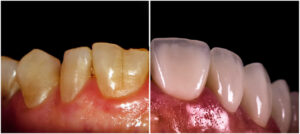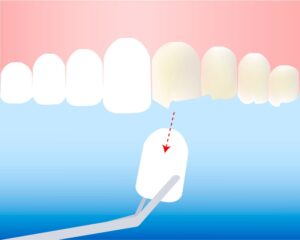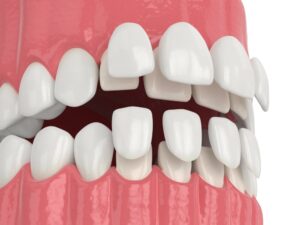In today’s article, we are going to talk about dental implants, and their pros and cons analyzed in depth. Getting dental implants is a big step in life, and people prefer to think about it well. Our goal with this post is to help you make the decision with solid arguments. More and more studies and research show that dental implants are by far the most successful and comprehensive treatment to restore oral function today (98% of treatments are successful). But that does not prevent dental implants from having pros and cons, like everything in life.
Miami Perfect Smile: the best prices for dental implants in Miami
Before continuing with the article, we offer you our dental implant treatments in Miami. At Miami Perfect Smile you will find everything you need to make your smile look like you always dreamed of: perfect but natural, radiant but elegant, renewed but yours. We offer dental veneer treatments, smile design, dental implants, and others. In the link that we have just inserted, you can access our data on the phone or to schedule your first appointment and find out all the details.
Our treatments are carried out with the highest quality materials and state-of-the-art technology, to make your smile look perfectly natural. Your well-being is our goal. In our facilities you will receive careful and specialized treatment. Read the opinions of our patients and check their high degree of satisfaction with the treatments. Pleased patients are our best letter of introduction.

We accept all types of insurance and dental plans with which the patient is covered. And something very important: our prices are very reasonable. You can investigate, and you will see the excellent relationship between quality and price that we offer. That is why many people travel to Florida for dental implant treatment in Miami. Despite the travel expenses, our prices are still more reasonable than those in other States.
Pros and cons of dental implants
Let us now list and discuss in detail the pros and cons of dental implants. Later we will give you some links to medical and scientific research within specialized websites. This will help you expand on the information concerning the topics that interest you most.
10 advantages or pros of dental implants
In this section, we are going to gather 10 advantages among the many that we have found in the specialized literature on dental implants.
01. The most successful dental restoration treatment today
If you opt for dental implant treatment, rest assured that you are choosing the one that has proven to be the most effective oral restoration procedure today. Dental implants are a success from almost all points of view, as we will see throughout this list. With more than 40 years of experience performing this procedure and so much research on it, there are few mistakes that can be made.
02. Quick and painless procedure
Surgical intervention to place dental implants is performed by applying local anesthesia to the patient. It is not really considered complex surgery. When the area is anesthetized, an incision is made in the gum, and the implant is inserted into the bone (almost always by thread, although it can also be cemented).
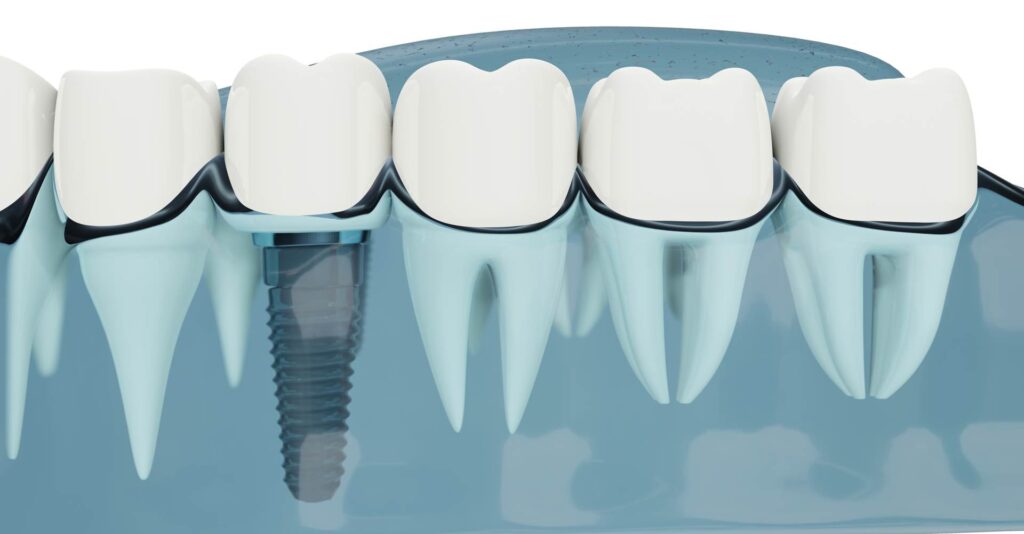
If the previous study and planning were carried out in detail, this whole operation lasts between half an hour and an hour. No more. After placing the implant, you have to wait between 1 month and a half and 3 months and a half, before the treatment can be completed by placing the crowns or dental prostheses.
03. Does not affect neighboring teeth
One of the main drawbacks of some cosmetic and restorative dentistry procedures is that sometimes, in order to repair a tooth, the adjacent or neighboring teeth must be affected in some way. Sometimes you have to carve them or remove a percentage of the enamel, sometimes you have to devitalize them, sometimes you have to use them as a support, etc.
Dental implants do not require these things, so the neighboring and adjacent teeth to the treated tooth are not affected. In this case, if there is only one dental root to be implanted, only that part is worked on. It is really a great advantage over other treatments.
04. Entirely under medical supervision
Some other aesthetic dentistry treatments include a certain stage that is completed at home, and there are over-the-counter products on the market that make it easier to do it on your own at home. This has economic advantages but carries certain health risks. This is the case of, for example, tooth whitening. Although inexpensive kits for this are sold on the market, there is a risk of exceeding the dose of the whitening product and thus damaging the tooth enamel.
None of these risks are taken with the treatment of dental implants. Being a moderately complex procedure, which requires prior study with specialized equipment, local anesthesia and surgical intervention, it is performed entirely in the clinic, thanks to which there is no possibility of errors.

05. Biocompatible and hypoallergenic materials
There is no need to fear that dental implants are a foreign material inserted into organic (bone) tissue in the body. It has been shown that both titanium (except for people who are allergic to it) and zirconium are biocompatible, bioinert, and hypoallergenic for the vast majority of patients.
And as if that were not enough, these materials have fairly long use experience. Especially titanium has more than 40 years of widespread use and a huge amount of detailed studies from all points of view. Even in extreme cases where what is called “implant failure” occurs, that is, the implant fails to osseointegrate, these materials do not cause infections or other biochemical reactions.
06. Invisible: nobody will know that you have implants
There are various criteria for classifying and grouping the types of dental implants. Two of the main ones are: according to the material with which they are made and according to the place where they are implanted. From this second point of view, the implant can be placed on top of the bone or inside it.
The latter is the most frequent so the dental implant is not only inside the gum but even inside the maxillary or mandibular bone. This means that it will always be completely out of sight, even when the person is talking, laughing or opening their mouth for any reason. Unless the patient informs the rest of the people that they have dental implants, the others will not notice them by themselves.

It is a huge aesthetic and functional advantage over other traditional dental restoration procedures, such as dental fillings (especially if they are metallic colors), dental bridges (especially if they are removable), dentures or plates, or even certain types of dental veneers (especially those made of composite resin or composite, which do not fully imitate the natural color of the teeth).
07. Comfort of the fixed dental prosthesis, without being removable
Dental implants are an example of a successful combination between human tissue and external material. Once they osseointegrate, it is as if they were part of the organism. This occurs especially with zirconium, which biointegrates rather than osseointegrates. Thanks to this very organic integration, the patient does not experience any discomfort regarding the implant and can continue with their normal life. This is a great advantage over removable dentures.
08. Treatment suitable for all ages
Dental implants can be used by people of any age. Except for cases of dental loss due to strong trauma, it is rare that this is used in minor patients. But aside from this particularity, dental implants can be used at any stage of life. Age is not an impediment to receiving these treatments.
Even elderly patients can perform the procedure, without implying any extra risk or different from those of other types of simple surgical interventions. It is known that patients over the age of 70 make little use of dental implant treatments. But there are studies that show that this attitude is due to lack of information or mistrust of sources.
When people of the geriatric age receive quality information from reliable sources, they resort more to dental implant treatments. We have more details on this theme in the Next article: Facilitators and barriers influencing the readiness to receive dental implants in a geriatric institutionalized population-A randomized non-invasive study.
09. They do not require much medical follow-up
Dental implants require very little medical follow-up once placed. During the first postoperative weeks, they require some supervision until they finally manage to osseointegrate and are considered ready to place crowns or dental prostheses on them. After this, they hardly require any medical follow-up.
The implants are very hygienic. Sometimes they are more hygienic than normal dentures. The patient should only follow the hygiene measures of a normal denture, and some other advice that the dentist provides.

10. Long durability after osseointegration
Thanks to the high quality of materials such as titanium or zirconium, the regular durability of osseointegrated dental implants are at least 20 years. This is due, in addition to the resistance of these materials, to the location of the implants within the gingival and bone tissue. As we have said, the most widespread today is to place dental implants within the bone tissue, not on it. Thanks to this, basically the implant is not subjected to direct mechanical wear, because it is not what is directly bitten or chewed with.
The duration of dental implants once placed, can also be influenced by factors such as the durability of the materials from which the implants are made, whether they are intraosseous or extraosseous implants, by the quality and quantity of maxillary bone of the patient, due to the person’s usual oral hygiene, and whether or not they have bad dental habits (bruxism, nail-biting, chewing hard materials or foods, etc.)
The duration of the implant (almost always screw-retained, or sometimes cemented) is not exactly the same as the duration of the prosthesis or crown that is placed on the implant. Implants, in fact, can last longer than dentures. Porcelain crowns (whether traditional porcelain or zirconia) will last longer than crowns made of composite or composite resin.
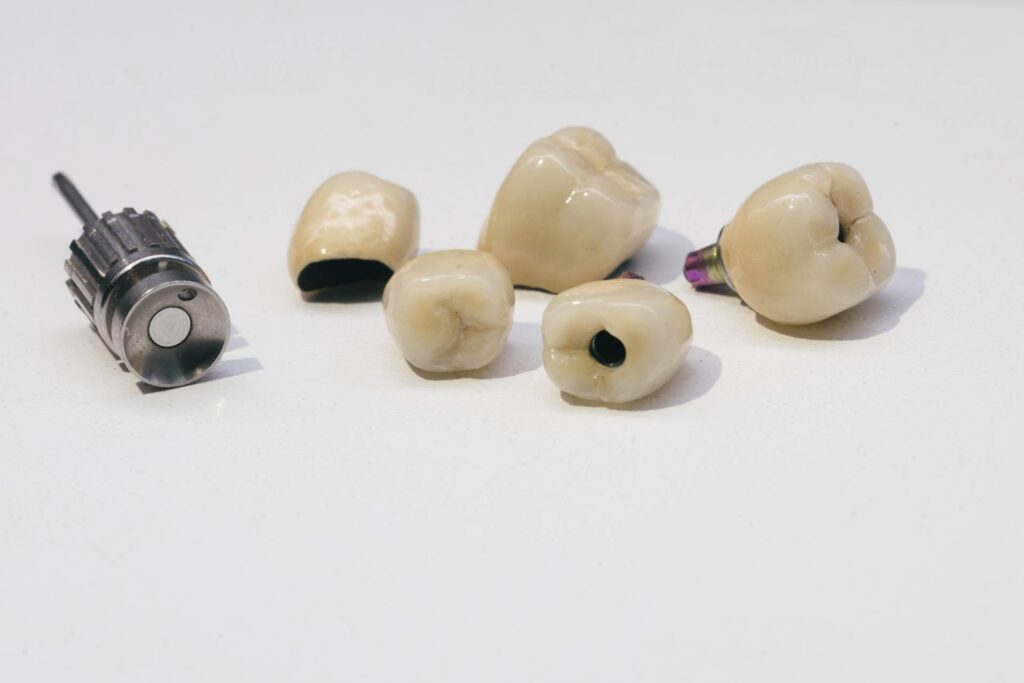
To this we must add that, if you take care of your teeth, dental implants can last much longer. Durations of between 35 and 40 years have been documented . Taking care of teeth with dental implants is not very different from taking care of natural teeth. It’s based on:
- Do not eat excessively hard or sticky foods.
- Do not use your teeth as tools to split, open or hold objects or containers.
- Avoid alcoholism and smoking.
- Depending on the natural design of the teeth, this may also involve flossing, interdental or interproximal brushes, and mouthwashes.
5 Disadvantages or cons of dental implants
1) It is one of the most expensive dental treatments
Possibly the biggest disadvantage of dental implants does not refer to clinical or dental aspects, but economics. Undoubtedly, dental implant treatment is one of the most expensive, and this is its most famous disadvantage, the one that is almost always pointed out to it. In fact, it is possibly the most expensive of all. A dental implant treatment ranges between $3,000 and $5,000 for each tooth.
Regarding the placement of the implants themselves (which is a surgical procedure, after all), we add the previous studies, and some preparatory procedures such as the extraction of certain damaged teeth, the cost becomes quite expensive. To this must be added the cost of crowns or dental prostheses, of which the implants are only the roots.
The most expensive variant would be the combination of dental implants with porcelain crowns since with composite or composite resin crowns the treatment is somewhat cheaper.
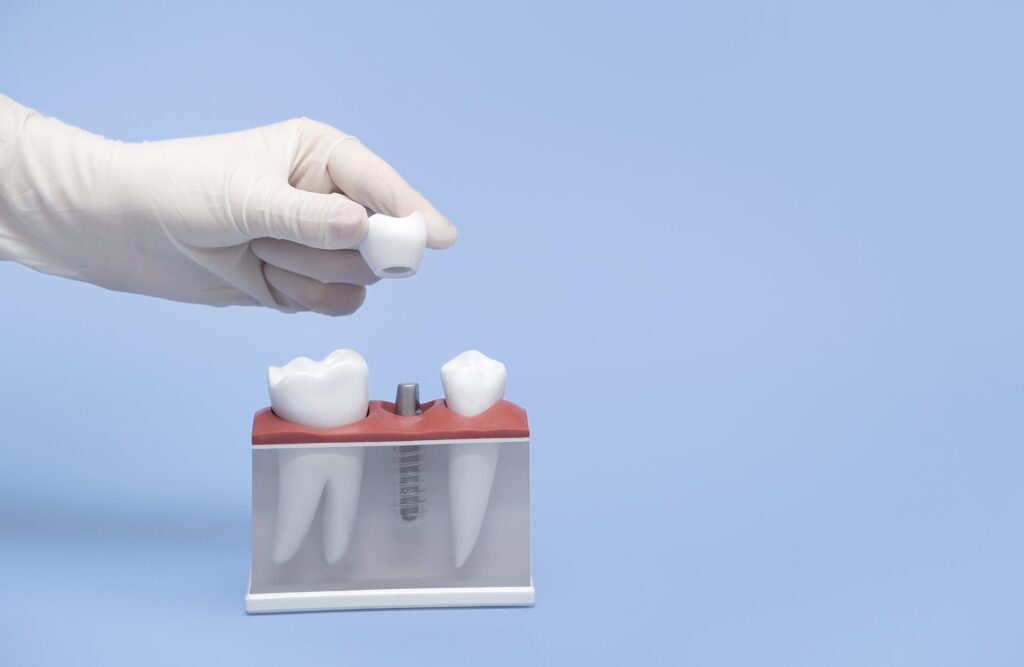
02. Some patients cannot use dental implants
Although dental implants are suitable for everyone, there is a small percentage of patients who are not recommended to use them. Pregnant women cannot receive the treatment while pregnant, and patients with poor oral hygiene, smokers, or alcoholics should not receive it.
Some patients with certain diseases that compromise healing or osseointegration (for example, diabetics), should not have dental implants. People whose maxillary bone is scarce or of poor quality are not advised to use implants, and the same is true for people who are allergic to metals or titanium. However, in the latter case, zirconium implants can be used, which are a fairly recent alternative that did not exist before.
03. Medical insurance does not usually cover dental implants
Medical insurance rarely covers dental procedures that may be cosmetic. Much less will people be covered for expensive procedures, such as dental implants. The vast majority of US states have passed laws that prevent even dental plans from fully covering dental procedures such as teeth whitening, veneers, or dental implants. These laws are called “Non-Covered Services”.
Private insurance, in these cases, is usually so expensive that it is practically not worth paying for it. Take a look at these two articles on the topic: “What You Need to Know About “Non-Covered Services”” (National Association of Dental Plan) and Think Twice Before Buying Private Dental Insurance ( Consumer Reports ).
04. Normal complications of dental implants
In the case of dental implants, in a small percentage of patients some local pain and inflammation, infections, acute sinusitis, minor bleeding, low-grade fever may occur during the 72 hours after the intervention, etc. With the aim of supervising that these symptoms remain within normal terms, if necessary, the dentist can establish some visits to the clinic for control check-ups.

05. Long-term complications of dental implants
As we have already said, the success rate of dental implants is around 98% of cases. This reveals an overwhelming and resounding degree of effectiveness. However, in a very small fraction of cases, despite treatment planning and the high suitability of biocompatible materials such as titanium and zirconium, the body may reject implants. This is called “implant failure” and is extremely rare.
Also in a very small percentage, other long-term complications of dental implants can be:
- Frequent pain: Short-term pain is normal. But if they become recurrent, they are already out of the ordinary. In this situation, it is better to consult a dentist.
- Chronic sinusitis or rhinitis: Occurs if there is peri-implantitis (inflammation of the tissue in contact with the implant) at the maxillary level.
- Nerve injury due to contact with the implant: If too much pressure is exerted on the nerve during surgery, or if the implant is installed too close to the nerve, the nerve can be injured and cause paresthesia, that is, abnormal sensation in the skin, chin, lip or jaw, in the form of numbness, tingling, burning, itching, etc.
- Gum disorders: Gum disorders are related to gingival necrosis (death of gum tissue) due to implants. It may even be that the cap on the implant thread has become loose or dislodged.
- Implant fracture: The materials of dental implants are extremely strong, and among the most resistant in nature. But they are not unbreakable, especially if the patient does not take care of the implants and subjects them to non-recommended activities (using teeth as tools, biting hard food, etc.)
To understand more details about dental implant complications, you can read this Research Gate article titled Complication of dental implants.

Types of dental implants today
The world of dental implants is in continuous research and development. That is why we have preferred to title this section: Types of dental implants today. Within a few months or a few years, the landscape of dental implants may have changed quite a bit, even along the lines of nanotechnology.
It is amazing the amount of dental implant research that can be found on some of the major scientific and medical journal websites. Click or tap on any of the following links, and go check what we tell you:
- Articles about dental implants in Research Gate
- Articles about dental implants in Frontiers
- Articles on dental implants in the National Library of Medicine
- Dental Implant Articles at Taylor & Francis Group
Dental implants have been a resounding success, and have proven their effectiveness in practice. That is why they are researched so much and continuously improved, in terms of procedures, typologies, and especially in terms of manufacturing materials. The main criterion for classifying the types of dental implants today is the material with which they are made.
This is of great importance because as it is mostly an endosseous or intraosseous procedure, osseointegration must be guaranteed, that is, the integration of the implant material with the bone tissue of the mandible or maxilla. From the point of view of the manufacturing material, there are 2 main types of dental implants:
- Metallic dental implants (titanium): They are mainly made of titanium, a metal of great strength and lightness, which has proven to be effective and durable and to have a high rate of osseointegration or integration with the maxillary or mandibular bone. Titanium dental implants have been in use for over four decades, and are by far the most widely used to this day: around 95% of implants placed are made of titanium. However, there is a small percentage of people who are allergic to this material.
- Ceramic dental implants (zirconium): They are made with ceramic material or with transition metals (zirconium or zirconia, hydroxyapatite, and monocrystalline aluminum oxide). They are remarkably strong materials but at the same time light, and achieve greater integration to the bone (biointegration). They are of more recent appearance and are used in other variants of dental treatments, such as veneers or crowns. About 5% of the implants that are placed are ceramic.
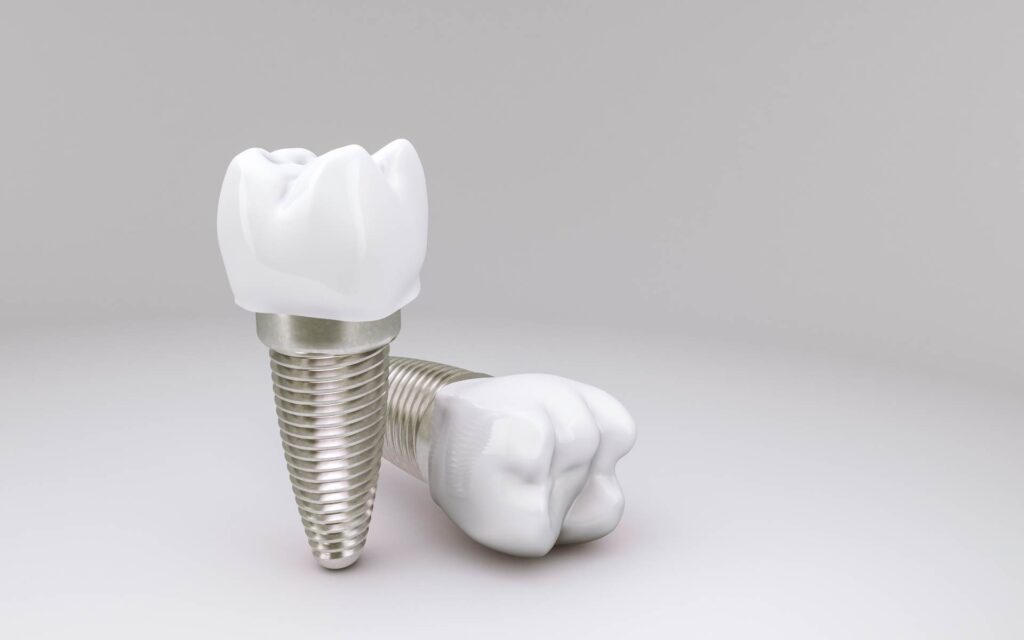
Both materials (titanium and zirconium) are hypoallergenic, biocompatible and bioinert. This means that once implanted, they integrate well with bone tissue and do not cause allergies or biochemical reactions in the vast majority of organisms. However, we reiterate, some people may have allergies to metals. In these cases, it is necessary to choose between ceramic implants and which material is indicated for that patient.
Do dental implants hurt?
The operation of placing dental implants itself does not hurt, since it is performed under local anesthesia. After placement, as with any surgical intervention, no matter how simple, dental implants can cause some normal pain or discomfort that we have already listed above. How much can implants hurt? That is something that depends on each person, their pain threshold, and even their subjective perception of pain.
There will be people who feel that nothing hurts, and others who will feel a little more pain. However, postoperative aches and pains should not last for more than a short time, ranging from 1 week to 10 days. After this, it is not normal for pain to persist. Except for very sporadic episodes. In case of any recurrent pain, it is better to go to the dentist.
After some time (the amount of time will depend on each person, but in general, it is usually between 6 weeks and 15 weeks), the body finally assimilates the dental implants and covers them with bone thanks to the process of osseointegration or bio integration, and then yes any pain should go away.
Chronic or recurring pain after osseointegration has already occurred is not normal. They can occur when the implant is inserted too close to the dental nerve, and the body generates infection and inflammation of the tissue around the implant (peri-implantitis), which can affect the alveolar nerve and cause pain, or rhinitis or sinusitis. All this should be treated by the doctor.

Other causes of unusual pain after the placement of dental implants can be: that the thread of the implant has become loose, that you have an allergy to titanium without knowing it, or that the dental implant is loose because the body has not achieved all osseointegration. In a very small percentage of cases, it may be that the body is not assimilating the implant. But, as we say, these are not normal pains. The normal thing is that dental implants do not give more than a slight discomfort at the beginning, after which, being so comfortable, you will not even remember that you have dental implants.



